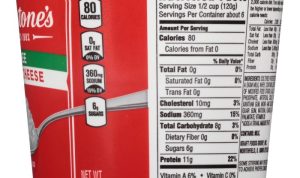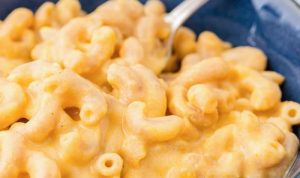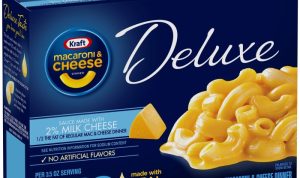Nutritional Profile of Great Value Cottage Cheese: Great Value Cottage Cheese Nutrition
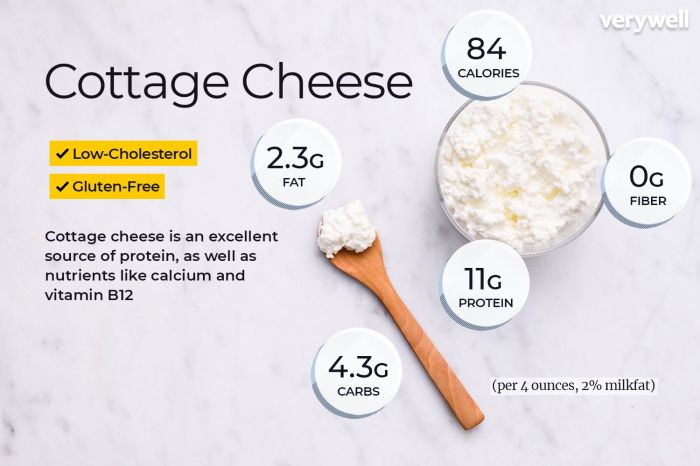
Great value cottage cheese nutrition – Great Value cottage cheese, like many store-brand products, offers a budget-friendly option for consumers seeking a protein-rich snack or meal component. Understanding its nutritional profile allows for informed choices regarding dietary needs and preferences. This section will detail the macronutrient and micronutrient composition of Great Value cottage cheese, comparing it to other brands and exploring the impact of fat content and serving size.
Macronutrient and Micronutrient Composition
A typical serving of Great Value cottage cheese provides a significant amount of protein, along with varying levels of fat and carbohydrates depending on the fat percentage (low-fat, 2%, whole milk). Micronutrients, while present in smaller quantities, contribute to overall nutritional value. The exact amounts vary slightly depending on the specific product and its manufacturing batch, but general ranges can be provided.
Precise values should always be checked on the product packaging.
Comparison with Other Brands
The following table compares the nutritional information of Great Value cottage cheese with three competitor brands. Note that values are approximate and may vary depending on the specific product and serving size. Always refer to the product label for the most accurate information.
| Nutrient | Great Value (Low-Fat, per 1/2 cup) | Brand A (Low-Fat, per 1/2 cup) | Brand B (Low-Fat, per 1/2 cup) | Brand C (Low-Fat, per 1/2 cup) |
|---|---|---|---|---|
| Calories | 80 | 90 | 75 | 85 |
| Protein (grams) | 14 | 15 | 13 | 16 |
| Fat (grams) | 0.5 | 1 | 0.2 | 0.8 |
| Carbohydrates (grams) | 6 | 7 | 6 | 5 |
| Calcium (%DV) | 10 | 12 | 8 | 15 |
| Sodium (mg) | 180 | 190 | 170 | 200 |
*(Note: %DV refers to Percent Daily Value based on a 2,000 calorie diet. Brand names are omitted to avoid endorsement.)*
Impact of Different Fat Percentages
The fat percentage significantly impacts the caloric and fat content of cottage cheese. Low-fat options generally contain less fat and fewer calories than whole milk varieties. However, whole milk cottage cheese often provides a richer flavor and a slightly higher amount of fat-soluble vitamins. Choosing between low-fat and whole milk depends on individual dietary preferences and goals.
For example, someone aiming to reduce their overall fat intake might opt for low-fat, while someone prioritizing a higher calorie intake might choose whole milk.
Variations in Nutritional Values Based on Serving Size
Nutritional information is typically provided per serving size, often 1/2 cup. Consuming a larger or smaller portion will proportionally alter the total macronutrient and micronutrient intake. For instance, doubling the serving size will double the calories, protein, fat, and carbohydrate content. It is crucial to pay attention to the serving size listed on the nutrition label to accurately track one’s dietary intake.
Health Benefits of Consuming Great Value Cottage Cheese
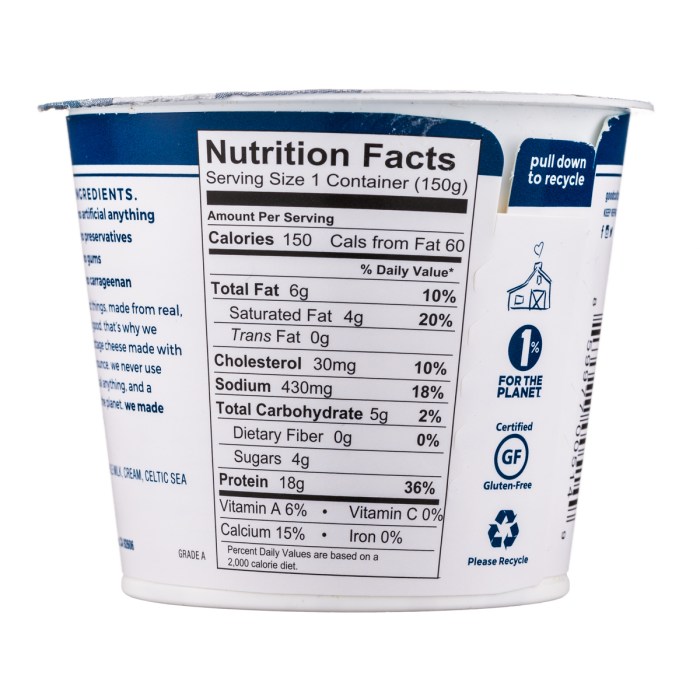
Great Value cottage cheese offers a range of health benefits stemming from its nutritional profile. Its composition of protein, calcium, and varying fat content contributes to various aspects of overall well-being. Understanding these benefits allows for informed choices regarding dietary intake and health management.
Protein’s Role in Muscle Building and Repair
Great Value cottage cheese is a good source of protein, essential for building and repairing muscle tissue. The amount of protein varies slightly depending on the fat percentage; however, a typical serving provides a significant contribution to daily protein needs. Protein is composed of amino acids, the building blocks of muscle. When we consume protein, our bodies break it down into these amino acids, which are then used to synthesize new muscle proteins or repair damaged ones.
This is particularly important for individuals engaging in regular physical activity, aiding in muscle growth and recovery after exercise. The high protein content in Great Value cottage cheese makes it a convenient and cost-effective option for supporting muscle health.
Calcium and Essential Minerals for Bone Health
Cottage cheese, including the Great Value brand, is a notable source of calcium, a crucial mineral for maintaining strong and healthy bones. Calcium is the primary structural component of bones, contributing to their density and strength. Adequate calcium intake throughout life, especially during childhood and adolescence, helps prevent osteoporosis and other bone-related diseases later in life. In addition to calcium, Great Value cottage cheese provides other essential minerals like phosphorus and magnesium, which work synergistically with calcium to support bone health.
These minerals contribute to bone mineralization and overall skeletal integrity.
Impact of Fat Content on Cholesterol Levels
The fat content in Great Value cottage cheese varies depending on the specific product (e.g., low-fat, reduced-fat, whole milk). Understanding the difference between saturated and unsaturated fats is crucial. Saturated fats, found in higher amounts in higher-fat cottage cheese varieties, can raise LDL (“bad”) cholesterol levels, increasing the risk of heart disease. Conversely, unsaturated fats, present in all varieties to some degree, can help lower LDL cholesterol and raise HDL (“good”) cholesterol.
Choosing a lower-fat variety of Great Value cottage cheese can help manage cholesterol levels more effectively. For individuals concerned about their cholesterol, opting for low-fat or reduced-fat options may be a more prudent choice. However, it’s crucial to remember that dietary fat is only one factor affecting cholesterol levels, and overall dietary patterns play a significant role.
Great Value cottage cheese offers a surprisingly high protein content, a stark contrast to the often-overlooked nutritional complexities of processed foods. A comparative analysis reveals that while cottage cheese provides a lean protein source, understanding the nutritional profile of other comfort foods, such as the often-calorie-dense mac and cheese nutrition , highlights the importance of balanced dietary choices.
Ultimately, the simplicity of Great Value cottage cheese’s nutritional makeup makes it a valuable component of a healthy diet.
Great Value Cottage Cheese in a Balanced Diet
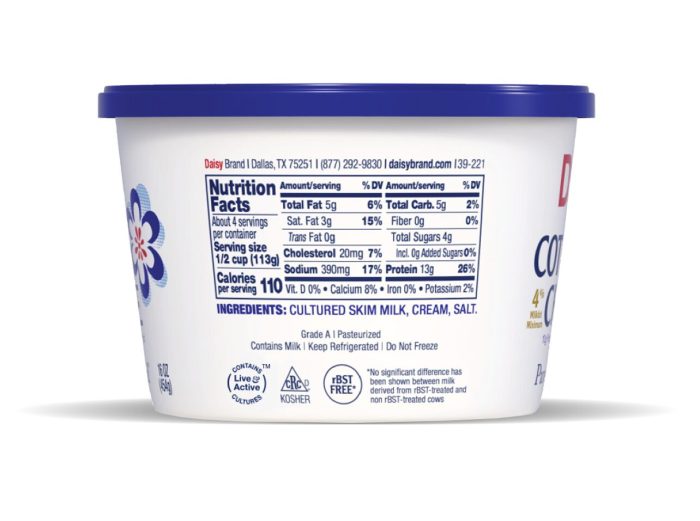
Incorporating Great Value cottage cheese into a balanced diet offers a convenient and affordable way to boost protein and calcium intake. Its versatility allows for seamless integration into various meal plans and recipes, contributing to a healthier lifestyle. This section will explore sample meal plans, recipe ideas, and a nutritional comparison with other popular protein sources.
Sample Meal Plan Incorporating Great Value Cottage Cheese
A balanced diet requires careful consideration of macronutrients and micronutrients. The following sample meal plan demonstrates how Great Value cottage cheese can be a valuable component of a healthy eating regime, providing essential protein and calcium throughout the day.
- Breakfast: 1/2 cup Great Value cottage cheese mixed with 1/4 cup berries and a sprinkle of chia seeds. This provides a protein-rich start to the day, combined with antioxidants and fiber.
- Lunch: A large salad with 1/2 cup Great Value cottage cheese, grilled chicken breast, mixed greens, and a light vinaigrette dressing. This offers a balanced combination of protein, healthy fats, and vitamins.
- Snack: 1/4 cup Great Value cottage cheese with a sliced apple. A simple and satisfying snack providing sustained energy and essential nutrients.
- Dinner: Baked salmon with roasted vegetables and a side of 1/2 cup Great Value cottage cheese mixed with chopped herbs. This provides lean protein, healthy fats, and ample vitamins and minerals.
Healthy Recipes Using Great Value Cottage Cheese
Great Value cottage cheese’s mild flavor and creamy texture make it a versatile ingredient in various healthy recipes. Its high protein content contributes to satiety and muscle building, making it a smart choice for fitness enthusiasts and those seeking to maintain a healthy weight.
- Cottage Cheese Pancakes: Combine Great Value cottage cheese with eggs, oats, and a touch of sweetener for protein-packed pancakes. The cottage cheese adds moisture and protein, making them a healthier alternative to traditional pancakes.
- Savory Cottage Cheese Muffins: Incorporate Great Value cottage cheese into savory muffin recipes with vegetables like zucchini and spinach for a high-protein, fiber-rich snack or side dish. The cheese adds a creamy texture and enhances the overall flavor profile.
- Cottage Cheese Dip: Blend Great Value cottage cheese with herbs, spices, and a touch of lemon juice for a healthy and delicious dip for vegetables or crackers. This provides a protein-rich alternative to high-calorie dips.
Nutritional Comparison of Great Value Cottage Cheese with Other Protein Sources, Great value cottage cheese nutrition
Understanding the nutritional profile of different protein sources helps in making informed dietary choices. The following table compares Great Value cottage cheese with Greek yogurt and eggs, highlighting their respective strengths and weaknesses. Note that nutritional values can vary slightly depending on the specific brand and preparation method.
| Nutrient | Great Value Cottage Cheese (per 1/2 cup) | Greek Yogurt (Plain, Nonfat, per 1/2 cup) | Large Egg (per 1) |
|---|---|---|---|
| Protein (grams) | ~14 | ~15 | ~6 |
| Calcium (mg) | ~100-150 | ~200 | ~25 |
| Fat (grams) | ~2-5 (depending on fat content) | ~0-2 (depending on fat content) | ~5 |
| Calories | ~80-120 (depending on fat content) | ~70-100 (depending on fat content) | ~78 |
Commonly Asked Questions
What are the best ways to use Great Value cottage cheese in recipes?
Think beyond just eating it straight! Use it in savory dishes like frittatas, quiches, and dips. It’s also amazing in smoothies for a creamy texture and protein boost.
Does Great Value cottage cheese contain artificial sweeteners or preservatives?
Check the ingredient list on the specific packaging you buy. Formulations can vary, so always look for yourself.
Can I freeze Great Value cottage cheese?
Yes, but the texture might change slightly upon thawing. It’s best to use it within a few months of freezing.
How does Great Value cottage cheese compare to Greek yogurt in terms of protein?
Greek yogurt generally has a slightly higher protein content per serving, but Great Value cottage cheese is still a good source of protein.


